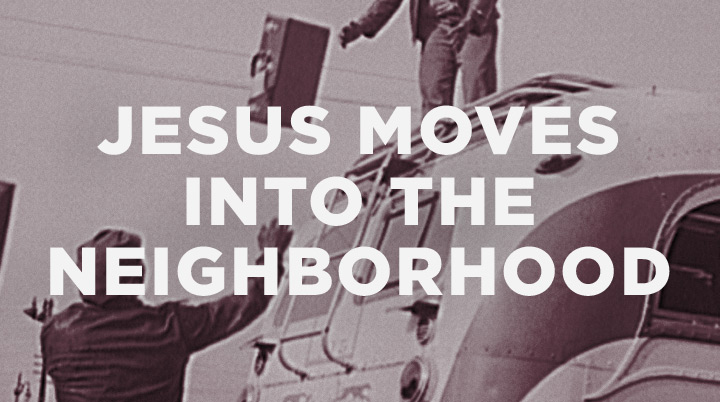Latest
-
Objections to the Christian Faith from the Unchurched and De-Churched
 Tue Dec 02, 2014
Tue Dec 02, 2014
by Resurgence -
Craig Groeschel: We Innovate for Jesus
 Tue Oct 14, 2014
Tue Oct 14, 2014
by Resurgence -
Mark Driscoll: Revelation
 Tue Oct 07, 2014
Tue Oct 07, 2014
by Resurgence -
RESURGENCE LEADERSHIP #034: JOHN PIPER, WHY I TRUST THE SCRIPTURES, PART 2
 Tue Sep 30, 2014
Tue Sep 30, 2014
by Resurgence -
Resurgence Leadership #033: John Piper, Why I Trust the Scriptures, Part 1
 Tue Sep 23, 2014
Tue Sep 23, 2014
by Resurgence

Archives
Jesus moves into the neighborhood through Bible translation

We have rarely considered the importance of language’s role in the Great Commission. And yet, language is the backbone of culture—the means to fulfilling it.
Prakash Amdabad is a poor farmer from northern Bihar, India, who has suffered from epilepsy most of his life. More than 50 years ago, his family was forced into landless poverty when Prakash’s landlord stole their property.
In 2012, Prakash’s son urged him, “Go to the church. They have a radio telling about Jesus in our language—He will heal you.” Eventually Prakash went and heard Bible stories, songs, and Scriptures in his own language. Prakash experienced Jesus in a powerful way and was miraculously healed of his epilepsy. With a changed heart, he began to pray for his powerful landlord, Yadav, who had stolen his family’s property.
One morning, with great courage, Prakash went to the house of Yadav and gave him a listening device with God’s Word in their common language. For the next four days, Prakesh prayed for Yadav. On the fifth day, the landlord came to Prakash’s village with his hands on his head—“My Prakash, ever since I started listening to this, I have been restless and not at peace. Please pray for me. I have come today to give you back your land. Please forgive me!”
How does a sick and illiterate man in an unassuming village become an agent to demonstrate God’s power, annulling injustice and bringing 65 other villagers to faith in Christ?
The Word of God moved in and transformed them.
Incarnation is translation
Those interested in the fulfillment of the Great Commission are familiar with the concepts of nation, tribe, and people (Matt. 28:19–20; Rev. 9:7). But until recently, we have rarely thought of language in terms of the Great Commission. And yet, language is the backbone of a culture and a people. Language holds the very essence of a people’s identity—their collective knowledge and history, reflecting their geographical location as a people, their conversations, songs, music, myths and perceptions of reality.
We the church are waking up to the significance of language to humankind and thereby the importance of language to the heart of God.
Jesus moving into the neighborhood is the picture of an incarnational church.
Christianity is a religion of translation. “In the beginning was the Word, and the Word was with God, and the Word was God. He was with God in the beginning. . . . The Word became flesh and made his dwelling among us. We have seen his glory, the glory of the one and only Son, who came from the Father, full of grace and truth” (John 1:1–2, 14, NIV). The divine became human. The high and all-powerful became weak and vulnerable.
Theologian Andrew Walls writes, “Incarnation is translation. When God in Christ became man, Divinity was translated into humanity, as though humanity were a receptor language.”
If incarnation is translation, what does that mean today?
Eugene Peterson’s The Message (considered a paraphrase of the Bible by many) captures the Incarnation of Jesus in John 1:14a in plain language: “The Word became flesh and blood, and moved into the neighborhood.”
Christianity is a religion of translation.
Jesus moving into the neighborhood! What a terrific picture of an incarnational presence. Jesus moving into the neighborhood is the picture of an incarnational church. And language and culture are the foundational backbone of identity for a people and for an incarnational church.
Bible translation is not simply about languages and completing translation products; it’s about an incarnational church working for transformation. About this reality, Tyler Kenney said, “Modern day translation of the Christian message continues Jesus’ work of coming to the common. People are saved, and their faith is nurtured, when they encounter Jesus in the language they know best.”
Jesus moved into Prakash’s neighborhood.
And yet, today there remain 1,967 languages spoken by people groups around the world without a single verse of Scripture in their own language. Another 2,280 languages have only portions of Scripture. For these 830 million people, Jesus has not yet moved into their neighborhood.
Visit The Seed Company, an affiliate of Wycliffe Bible Translators, to learn how you can help end Bible poverty.
